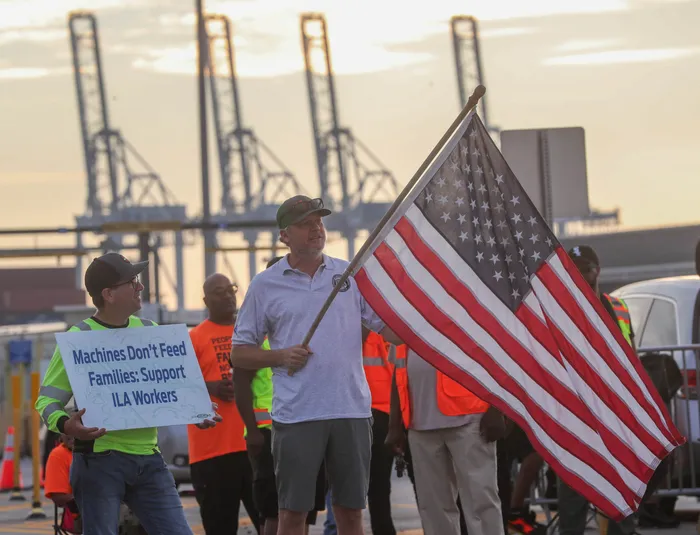Latest News
January 1, Dockworkers’ Strike Puts U.S. Ports and Economy on Edge

A union dockworkers’ strike that erupted early Tuesday is shaking up dozens of U.S. ports, and while the oil and gas industry isn’t feeling the pinch just yet, experts are sounding alarms about potential ripple effects if this work stoppage drags on.
The Department of Energy rushed to calm nerves, stating the temporary halt of operations at 36 East and Gulf Coast ports won’t immediately affect crude oil, gasoline, natural gas, and other liquid fuel imports and exports. They explained these tasks are managed by other workers, insulating fuel supplies and prices from an immediate shock.
However, oil and gas guru Adam Ferrari, CEO of Phoenix Capital Group, raised a cautionary flag. He told FOX Business that while the DOE’s analysis might hold for the short term, a prolonged strike could send shockwaves through the broader economy, impacting industries across the board, including oil and gas.
Ferrari underscored the critical role these East and Gulf Coast ports play, accounting for about half of U.S. container imports. Should this strike intensify, he warned the entire supply chain could face severe disruption.
American shoppers are already bracing for impact, stocking up on essentials as port strikes threaten to nudge prices skywards.
The supply chain’s functionality is vital for maintaining a smooth flow of oil and gas products, and disruptions from this strike could spell trouble with shipments and lead to shortages. Ferrari also mentioned potential hiccups in the labor-intensive loading and unloading of natural gas products, which could spark price hikes felt by consumers.
“This is a domino effect,” Ferrari noted. Soaring gas prices could rattle stock prices, stir investor and market anxiety, and strain an already tense regulatory landscape.
Energy market analyst Phil Flynn chimed in with his thoughts in the Phil Flynn Energy Report, indicating the dockworkers’ strike might undercut demand for oil in the short term. Though oil tankers and LNG operations remain untouched, the standstill in container shipping could reduce oil consumption. Flynn urged preparedness for possible factory shutdowns due to the strike, which might edge the nation closer to a recession, further depressing oil demand.
In a historic flashback, the International Longshoremen’s Association (ILA) has initiated its first strike since 1977 following the lapse of its six-year contract with the U.S. Maritime Alliance (USMX). The deadlock in negotiations over wage hikes, compensation, and protection from automation at ports has brought port operations to a grinding halt.
Various industries are feeling the heat, with trade groups clamoring for President Biden to step in. Major business organizations such as the Associated Builders and Contractors (ABC), National Association of Wholesaler-Distributors (NAW), National Retail Federation (NRF), National Association of Manufacturers (NAM), and the U.S. Chamber of Commerce are urging the President to employ the Taft-Hartley Act to keep ports running while negotiations unfold.
However, Biden has made his stance clear, stating he doesn’t “believe in Taft-Hartley,” leaving business groups anxious as U.S. seaports from Maine to Texas brace for the ongoing strike’s impact. These ports, pivotal for about half of U.S. imports and vital for exports, are now in a state of uncertainty.
Though a JPMorgan analysis pegged the daily cost of the strike at a staggering $3.8 billion to $4.5 billion, the Anderson Economic Group anticipates a lighter toll, estimating $2.1 billion for the first week. Regardless, experts agree the strike’s duration – and its economic fallout – could hinge on Biden’s willingness to intervene.
As our loyal readers, we encourage you to share your thoughts and opinions on this issue. Let your voice be heard and join the discussion below.

-

 Entertainment3 years ago
Entertainment3 years agoWhoopi Goldberg’s “Wildly Inappropriate” Commentary Forces “The View” into Unscheduled Commercial Break
-

 Entertainment2 years ago
Entertainment2 years ago‘He’s A Pr*ck And F*cking Hates Republicans’: Megyn Kelly Goes Off on Don Lemon
-

 Featured3 years ago
Featured3 years agoUS Advises Citizens to Leave This Country ASAP
-

 Featured2 years ago
Featured2 years agoBenghazi Hero: Hillary Clinton is “One of the Most Disgusting Humans on Earth”
-

 Entertainment2 years ago
Entertainment2 years agoComedy Mourns Legend Richard Lewis: A Heartfelt Farewell
-

 Latest News2 years ago
Latest News2 years agoNude Woman Wields Spiked Club in Daylight Venice Beach Brawl
-

 Featured3 years ago
Featured3 years agoFox News Calls Security on Donald Trump Jr. at GOP Debate [Video]
-

 Latest News2 years ago
Latest News2 years agoSupreme Court Gift: Trump’s Trial Delayed, Election Interference Allegations Linger
JOHN DAVID
October 5, 2024 at 7:35 pm
Don’t you know it’s over?